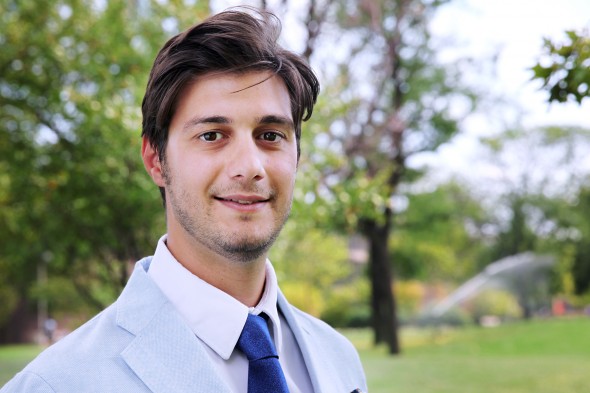What’s the perfect recipe for opening a restaurant?

Restaurants are putting on a show with open kitchens, says Antonio Giuliani, assistant professor of managerial studies. “It becomes part of the experience diners expect, to be entertained and see how your food is prepared.”
As a teacher and researcher of entrepreneurship — and someone who likes to eat — Antonio Paco Giuliani is into fine dining.
“I look at how people start businesses, combined with an interest of mine, the fine dining industry,” he says. “I’m interested in understanding how business models are developed.”
That segment of the industry is growing in this country, especially when compared with fast food and other quick-service restaurants. One feature is what he calls “experience economy” — bringing what happens behind the scenes into the spotlight to make it a show.
“That’s why you see open kitchens, so you can see what’s happening. It becomes part of the experience diners expect, to be entertained and see how your food is prepared.”
Operating a restaurant, or many restaurants, is a team effort, said Giuliani, assistant professor of managerial studies in the College of Business Administration.
“You might have a guy dedicated to developing the menu — the chef — a real estate guy, a finance guy, a PR person,” Giuliani said. “You put together this network to go out and scale up the business or open multiple venues.”
Chicago, he said, “is a great example.” He pointed to two hospitality management groups. One Off Hospitality owns Avec, the Publican, Nico Osteria, Big Star and three other establishments. “They have different menus, atmospheres, price points,” he said. Lettuce Entertain You has 54 restaurants in the Chicago area, and in other spots around the country, including five each in Las Vegas, Minneapolis and the D.C. metro area.
Having all these restaurants with differing positions and concepts “gives you the latitude to take risks on hiring a young person who might show some talent for learning,” Giuliani said. “Learning the basics, and moving from restaurant to restaurant and ending up in fine dining.”
This employee is not only young — “it’s not unusual to see kids of 18 working in the kitchen” — but usually doesn’t have a formal culinary education. “He develops unique skills, enough to maybe take the reins while the owner may be starting other restaurants, or he may go out and start his own,” Giuliani said.
“The intersection of excellent service, ambience and food”
Asked to define “fine dining,” he said, “price point — to me that is not a very good measure. There’s a good deal of subjectivity. It’s the intersection of excellent service, ambience and food, the care that is put into the food preparation and the sourcing.”
Giuliani eats out a couple times a week as part of his research. “I have acquaintances in the industry, which makes it easier to navigate and know the places or dishes to check out,” he said.
When not in a restaurant, he’s cooking at home. “It’s one of my passions,” he said. “I never buy pre-made food.”
Growing up in Bologna, Italy, he answered to his middle name, Paco. “It’s a Spanish name although I have no Spanish roots,” he noted.
He speaks English without an accent. “I learned it when I was 6 years old,” he said. “A group of classmates signed up for class at a private institution. It got me ahead of the game, and I always listened to American or British music, especially rock music.”
Giuliani earned a bachelor’s degree at the University of Bologna, where he also received his master’s — cum laude — and Ph.D., all in management.
Before starting his doctorate, he spent half a year at the University of California, Berkeley, as a research assistant. After earning his Ph.D., he worked for two years as an instructor and postdoctoral fellow with a Pennsylvania State University professor he’d met at summer school in Tuscany. Giuliani started at UIC in 2011.
For someone who constantly has food on his mind, he manages to stay slender. “I restrain myself,” he said. “And I bike a lot.”
His figure, and the stylishness of his attire, was noticed by Chicago Chic, an online documentation of the city’s fashion, art and music. Its April 20, 2013, edition heralded Giuliani as “One of the Most Stylish Men in Chicago.”
